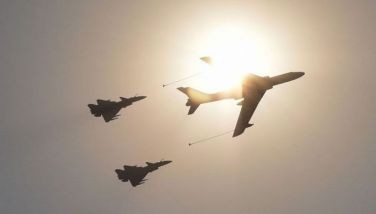News Analysis: Lawmakers question legality of bases access deal with US
MANILA (Xinhua) - While government officials have said that the security agreement that would allow the United States to have access to Philippine military bases is almost a done deal, top congressional leaders here have questioned its legality.
On Friday, Defense Undersecretary Pio Lorenzo Batino, who heads Philippine panel in the negotiations with the US side, said that the Agreement on Enhanced Defense Cooperation (AEDC) between Manila and Washington is "80 percent" done.
Both sides hoped that the final draft of the pact could be signed during the scheduled visit to Manila of US President Barack Obama next month.
The US used to have military bases in the country until the Philippine Senate in 1992 voted to end their lease contracts due to strong anti-American sentiment.
But the Visiting Forces Agreement (VFA) that went into force in 1999 allowed US troops to return to the Philippines for joint military exercises, and thousands of American soldiers regularly visit the country during war games.
Negotiations for AEDC began in August last year. If approved, the deal would allow larger numbers of US troops to have temporary access to Philippine military camps and bring in aircraft, ships and humanitarian equipment.
The Philippine military facilities that would be opened to American forces are in Manila, Pampanga, Zambales, Palawan, Cebu, Nueva Ecija and La Union.
Since 2002, hundreds of US troops have already been deployed in the Southern Philippines to provide counterterrorism training to Filipino soldiers.
The Philippine negotiators did not say whether there will be any limit to the number of US troops or their length of stay in the Philippines.
According to Batino, the agreement would be legally binding and would not require ratification by the Philippine Senate, adding that passing on the deal to the Senate for ratification would delay the actual US deployment.
But on Saturday Senator Miriam Defensor-Santiago said the proposed accord is a treaty by nature and should require Senate ratification.
Santiago said that any agreement involving the posting of troops and war equipment in another sovereign state is a treaty.
She said that while the President is authorized to negotiate or even approve an agreement, such deal "should only be limited to a topic connected to a prior treaty."
According to Santiago, it would be incorrect for the government to invoke the Philippine-US Mutual Defense Treaty of the l950s as a "prior treaty" since allowing foreign troops and equipment on Philippine soil "is a major subject in itself."
"So it cannot be classified as an executive agreement but as a treaty to which the Philippine Senate must give its concurrence," Santiago said.
Representative Rodolfo Biazon, a former chief of the Philippine military, echoed Santiago's stand, citing three conditions for a treaty to be ratified by the Senate.
"These are if the treaty or agreement is political in nature, if it is a permanent, or if it would require a change in national policy. If any of these exists, then the Senate approval is a must, " Biazon said.
Militant lawmakers in the House of Representatives also questioned the wisdom of giving access to the Americans to Philippine military bases.
In a statement on Saturday, Bayan Muna (Country First) Representative Neri Colmenares said that the Filipino people decided to remove the American military bases in l992 not only because their presence violated our sovereignty but also because they were "magnets from attack" from many enemies of the United States.
"The presence of US troops here will increase the tension in the region and threaten its stability. We do not want to become another Iraq where US troops remained even when Saddam Hussein has long been dead," Colmenares said.
Carlos Zarate, also a Bayan-Muna representative, said that the agreement was "deceptive and lopsided... imposed by the US to advance its... interests as it pivots its military might in Asia."
"The US has a lot of enemies around the world and we can be embroiled in war if there is an attack against the US because we are bound under the Mutual Defense Tready (MDT) to help in cases of attacks against them," Zarate said.
He said that instead of another basing agreement with the US, the Philippines should scrap the MDT and the VFA.
- Latest
- Trending




























